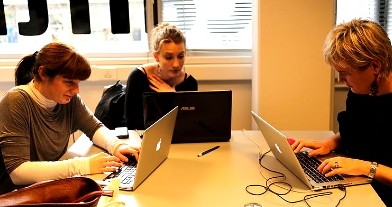Not for the first time and certainly not for the last, our industry is coming up against a little trouble with terminology.
The flexible workspace sector is home to all manners of different types of workspace. Those ‘in the know’ understand the subtle differences between a coworking space and a shared office, or a serviced office and a managed office.
As the industry settles into the mainstream, the wider business community is catching on to the vast variety of flexible workspace available. Indeed what was once a niche industry has blossomed into a fast-paced and exciting sector alive with with multiple types of workspace, to suit an equally diverse array of clients (who are doing their best to keep up with the lingo).
And it’s working. The latest stats from the UK business centre market confirmed that the UK sector is now worth over £2 billion and is home to around 80,000 businesses. As for coworking, there are now over 780 coworking spaces in the US alone (2013 figures), which increased by 83% from 2012-2013, according to a report released early this year by NAIOP.
So what’s the problem?
As fast as the industry develops, buzzwords and catchy media-friendly phrases are peppering SEO strategies and advertising campaigns worldwide. While that’s a great way to attract attention and make sales, it comes with a very important caveat: what you speak and print must match what you sell.
Take coworking for instance.
Coworking evangelists probably sound like a broken record when they say: “It’s not just a shared office”. It might seem that way to the uninitiated, but as we know, it comes with so much more: an entrepreneurial vibe, a sense of community, a sharing of knowledge, a chance to learn from those around you. Oh, and good coffee.
Yet it seems a few workspace operators are jumping on the coworking bandwagon and using the buzzword to sell space that doesn’t quite fit the bill.
Read the below post by Victoria Arnold, founder of DeskUnion, for a very fitting example.
Of course no-one is immune to the temptation to get a little over-zealous in their advertising campaigns, or to inject product keywords that are a little wide of the mark. The problem comes when clients leave the space feeling disappointed, or believing they’ve been mis-sold. In our age of social media and digital transparency, bad experiences spread like wildfire – leaving carefully built reputations at the mercy of others.
Cleaning up industry jargon is easier said than done, particularly in a sector that’s growing and expanding so fast. Perhaps what’s needed is greater sensitivity over terminology usage, and an acceptance that maybe, just maybe, the space in question really isn’t a coworking space, but a shared office after all. We’d love to know what you think.
Image source: Florence Morvan, Wikimedia Commons
—————————————————————————
The Danger of Mainstreaming ‘Coworking’
By Victoria Arnold, Founder and CEO of DeskUnion
Article originally appeared on LinkedIn Pulse 18th December 2014
Just this week I received a message from someone in the UK looking for coworking advice. They were excited to have found a locally listed coworking space after feeling isolated working from home. However, on going for a tour of the space they were greeted by this…
Quite possibly the most uninspiring workspace I’ve seen to date. The space described itself as, “vibrant”… erm am I missing something?!
But that’s the problem when terminology becomes mainstream. The effect being that people like the person aforementioned, are sold a vision and think that they’ve found the solution to their isolation woes. But after seeing the ‘merchandise’ in person, they lose faith in “coworking” and go back to what they’ve always known.
Yes mainstream is good, but it also dilutes the value proposition.
The irony is that if this “coworking” space invested in a lick of colourful paint, upcycled their furniture and curated a home-from-home environment then they might actually have a space to be proud of.
But simply, you can’t throw some desks into a cupboard and call it “coworking”… you’re asking people to part with money, leave the comfort of their homes and invest their time in travelling to your space. At least have the courtesy of making it worth the journey.
Common sense anyone?!
Luckily, in the case above the person was left so uninspired by their experience that they are looking to start their own space! Judging by the competition I think they could be onto a winner.



 Dr. Gleb Tsipursky – The Office Whisperer
Dr. Gleb Tsipursky – The Office Whisperer Nirit Cohen – WorkFutures
Nirit Cohen – WorkFutures Angela Howard – Culture Expert
Angela Howard – Culture Expert Drew Jones – Design & Innovation
Drew Jones – Design & Innovation Jonathan Price – CRE & Flex Expert
Jonathan Price – CRE & Flex Expert













